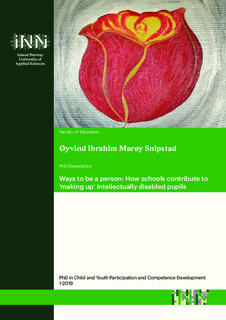| dc.contributor.author | Snipstad, Øyvind Ibrahim Marøy | |
| dc.date.accessioned | 2020-01-03T12:01:55Z | |
| dc.date.available | 2020-01-03T12:01:55Z | |
| dc.date.issued | 2019 | |
| dc.identifier.isbn | 978-82-8380-126-2 | |
| dc.identifier.uri | http://hdl.handle.net/11250/2634784 | |
| dc.description | Reference article 3: Snipstad, Ø. I. M. (2019). Inclusive education: ‘making up’ the normal and deviant pupil. Disability & Society, 1-21. doi:10.1080/09687599.2019.1680342 | nb_NO |
| dc.description.abstract | How do ‘kinds’ of knowledge and practices existing within schools contribute to
‘making up’ intellectually disabled pupils in relation to perspectives on inclusion?
This project departs from a micro-perspective on inclusion where the object of study is the
processes that take place within educational institutions and between actors in the classrooms
and other contexts at schools. Based on this, the dissertation aims to understand how
education contributes to ‘making up’ intellectually disabled pupils. Drawing on the theoretical
works of the Canadian philosopher Ian Hacking, this project discusses how produced
knowledge, stereotypical assumptions, values, beliefs and so on that are implemented in the
category ‘intellectual disability’ affect organisational practices, which in turn interact with the
children classified as intellectually disabled and influence how they understand themselves
and their surroundings.
The dissertation consists of three articles that are based on empirical data gathered from three
pupils diagnosed with intellectual disability. The three informants are each devoted their own
article. Individually the articles discuss different issues and themes related to different
dimensions of inclusion, respectively: participation, fellowship, democracy and benefit. Based
on the mentioned perspectives on inclusion, the purpose of the articles is to discuss how
intellectual disability as a category affects the surroundings attitudes, practices, assumptions,
understandings and so on, which in turn provides certain descriptions from which the
classified pupils experience, behave and act.
The project argues that the beliefs and practices that pupils classified as intellectually disabled
are subjected to in school play a major role in regards to the kind of person it is possible for
them to be. When education is organised based on beliefs that intellectual disability refers to
pupils that deviate from others, the descriptions available for them to interact with will also be
of a deviant kind. On the other hand, if education provides descriptions related to high
expectations, ambitions and opportunities for all, the way in which it is possible to be a pupil
for children classified as intellectually disabled might thus resemble normalised descriptions
similar to those available to their peers. Just as interacting with perspectives that consider
intellectually disabled children as different or special might construct barriers relating to
normative standards of society, more socially oriented approaches to education might
contribute to deconstructing barriers for present and future participation. | nb_NO |
| dc.description.abstract | Hvordan bidrar kunnskap og praksiser i skolen til å konstruere utviklingshemmede
elever forstått relasjon til perspektiver på inkludering?
Utgangspunktet for dette prosjektet er et mikro-perspektiv på inkludering. Studiens objekt er
prosessene som foregår innad i utdanningsinstitusjoner og mellom aktører både i og utenfor
klasserommet. Med dette som utgangspunkt tar avhandlingen videre sikte på å forstå hvordan
utdanningsinstitusjoner bidrar til å konstruere utviklingshemmede elever. Basert på teorier av
den kanadiske filosofen Ian Hacking, diskuterer denne avhandlingen hvordan produsert
kunnskap, stereotypiske antagelser, verdier, oppfattelser og overbevisninger som er
implementert i kategorien utviklingshemming påvirker organisering og praksis. Betydningen
av organisering og praksis diskuteres videre i relasjon til hvordan elever klassifisert som
utviklingshemmet forstår seg selv og sine omgivelser.
Avhandlingen består av tre artikler basert på empiri hentet fra tre elever som alle er gitt en
utviklingshemmingsdiagnose. Hver av de tre informantene er viet sin egen artikkel. De tre
artiklene diskuterer ulike utfordringer i skolen knyttet til ulike dimensjoner av inkludering,
henholdsvis; deltakelse, fellesskap, demokrati og utbytte. Med utgangspunkt i disse fire
dimensjonene av inkludering er formålet med artiklene å diskutere hvordan kategorien
utviklingshemming påvirker omgivelsenes holdninger, antagelser og praksis, som videre gir
visse beskrivelser de klassifiserte kan handle, erfare og oppleve ut ifra.
I prosjektet argumenteres det for at organisering og praksis som elever klassifisert som
utviklingshemmede i skolen møter spiller en viktig rolle med tanke på hvilke ‘type’ menneske
det er mulig for dem å være. Dersom utdanningen er basert på en antagelse om at
utviklingshemming betegner elever som avviker fra andre, vil beskrivelsene som er
tilgjengelige for dem også være av en avvikende ‘type’. Imidlertid vil også en utdanning som
er organisert slik at alle elever møtes med høye krav og forventninger i skolen kunne gi
utviklingshemmede tilgang på normaliserte beskrivelser å handle, erfare og oppleve ut ifra. På
samme måte som en utdanning basert på perspektiver om utviklingshemmede som annerledes
eller spesielle kan bidra til å konstruere barrierer for deltagelse, kan perspektiver som er mer
sosialt orienterte bidra til å redusere eller fjerne nåværende og fremtidige barrierer for
deltagelse både i skolen og i samfunnet for øvrig. | nb_NO |
| dc.language.iso | eng | nb_NO |
| dc.relation.ispartofseries | PhD in Child and Youth Participation and Competence Development; | |
| dc.rights | Attribution-NonCommercial-NoDerivatives 4.0 Internasjonal | * |
| dc.rights.uri | http://creativecommons.org/licenses/by-nc-nd/4.0/deed.no | * |
| dc.title | Ways to be a person: How schools contribute to ‘making up’ intellectually disabled pupils | nb_NO |
| dc.type | Doctoral thesis | nb_NO |
| dc.subject.nsi | VDP::Samfunnsvitenskap: 200::Pedagogiske fag: 280::Spesialpedagogikk: 282 | nb_NO |

